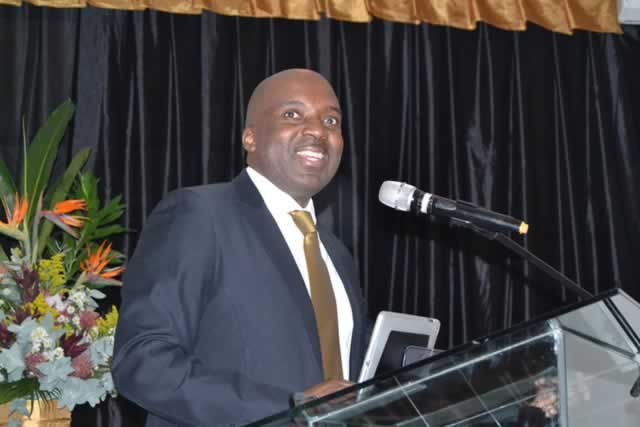



Dr Paul Chimedza, deputy minister of Health, was one of the key speakers at the Association of Health Funders of Zimbabwe conference recently.
ZIMBABWE’s medical aid societies are slithering into bankruptcy due to escalating medical aid claims, with a recent hike in tariffs ordered by government likely to worsen their already precarious position, industry players warned. The situation could affect at least 1,6 million Zimbabweans who still depend on medical aid, a form of insurance that protects individuals financially should they be in need of medical or health care.
Information obtained by the Financial Gazette indicates that most medical aid societies have started tapping into their reserves, and many are already facing solvency challenges due to a grave mismatch between income and claims. Figures indicate that claim payments from medical aid societies have been rocketing for the past three years against dwindling financial inflows from an economically struggling membership.
Last year, medical aid societies paid service providers US$342 million, a 50 percent jump on the US$174 million the sector paid in 2012. In 2011 medical aid societies paid out US$155 million. “Effectively medical aid societies have dug into their reserves to make these payments and now they are basically living from hand to mouth,” said Shylet Sanyanga, Association of Health Funders of Zimbabwe chief executive officer.
An Insurance and Pensions Commission report has indicated a -51,69 percentage change in the health class’ gross premium written, which is the amount of money being paid as insurance for the various medical aid schemes. While premiums for the first quarter of 2013 amounted to US$381 263, a paltry US$184 200 was recorded during the first quarter of 2014.
Explaining the statistics to the Financial Gazette, IPEC Commissioner, Manett Mpofu, said: “As you may be aware, our economy has not been performing well and many companies closed down during the period January 2013 to January 2014. Closure of companies or scaling down of operations by companies leads to, among other things, failure to remit medical aid contributions and hence the decline.”
She added: “Obviously the implications are that many employees of the closed companies or companies that have cut down operations no longer have access to medical aid services and this will lead to loss of confidence in the providers of these services by the public.” But a government minister immediately down-played fears of a sector-wide collapse, saying medical aid societies were dishonest and “hiding behind a finger”.
“(Medical aid societies) are trying to hide behind a finger. They are not being honest and open. When they want public sympathy, they rush to the press,” said Deputy Minister of Health and Childcare, Paul Chimedza. But insurance industry experts and medical aid society players said there was already a crisis in the industry, which was likely to be worsened by a recent upward adjustment in tariffs by government. An executive with one medical aid society said medical aid societies were already liquidating their reserves, most of which were in the form of prescribed assets, to meet claims.
The danger is however that if these buffer assets are depleted, medical aid schemes will eventually fail to pay for claims made by service providers, seriously endangering the life of medical aid schemes. Chimedza said there was delinquency in medical aid societies which was undermining their operations.
“Money being collected are public funds. They (medical aid societies) must produce figures of what they are earning and paying each other as salaries. We have allowed them to operate without a buffer because of the difficult economic situation. Ordinarily, we should have closed all of them because they are not meeting their statutory obligations,” fumed Chimedza, who accused the medical aid organisations of insincerity.
“We have allowed them to increase contributions rates four times since dollarisation and now they are offering service providers a US$1 increase in tariffs. What has happened to all the money they have been collecting? Should we allow hospitals to collapse and doctors to leave this country due to the very low tariffs, just to serve medical aid societies? They are business people. They should know how to run their businesses to survive,” Chimedza said.
Although the Financial Gazette could not immediately determine how many medical aid societies are in the red, indications are that the majority are tottering on the brink of collapse After protracted negotiations between medical aid societies and service provider that lasted more than eight months, failed to yield an agreement, government gazetted new tariffs. The move has further driven the medical aid societies into the doldrums, according to sector players.
General practitioners’ consultations fees were increased from US$20 to US$35 after medical aid societies refused to accept the doctors’ demand for US$75. Doctors had also refused to accept the medical aid societies’ request that fees remain unchanged because members were struggling to pay contributions.
Of critical concern to the societies is the fact that since dollarisation in February 2009, income has dwindled as companies shut down due to unrelenting tough economic conditions. Companies that are still operational are struggling to meet their medical aid obligations, medical aid society executives said, as well as employee wages owing to serious illiquidity challenges affecting the country. As a result, membership off medical aid societies has stagnated at 1,6 million. The formal sector now constitutes less that 20 percent of the economy.
“Due to the numerous challenges owing to the macro environmental factors, the industry has spent energies operating in fire fighting and survival mode,” Sanyanga told a recent AHFoZ conference, adding that medical aid societies are being forced to accept subscription payment plans offered by employer organisations because they realise that the existing operating environment required flexibility.
“Failure to be flexible meant that medical aid societies would terminate many firms and this could have damaged the sector beyond repair,” she noted. While the Government of Zimbabwe accepts the serious challenges confronting both the medical aid schemes and service providers, it is also concerned by the many cases of financial abuse and poor corporate governance by both parties.
“We would like to see good governance in medical aid societies so that the funders’ fiduciary duties are carried out efficiently and ethically… We hear that some providers are engaging in unethical practices and committing fraud. Let me state that if evidence of fraud is provided, the regulator will not hesitate to take disciplinary action in order to clean up the sector of these criminal elements before they rub-on to others,” Chimedza said.
newsdesk@fingaz.co.zw